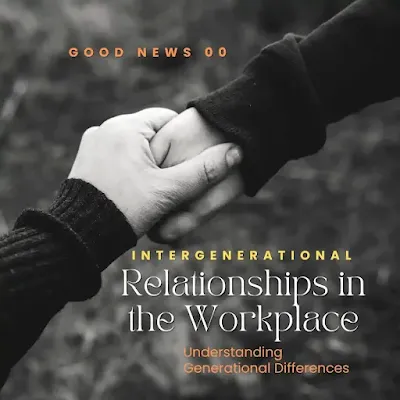TitlBridging the Generation Gap: Understanding and Navigating Intergenerational Relationships in the Workplace
In today's diverse workforce, one of the most significant challenges faced by organizations is managing intergenerational relationships. With baby boomers, Generation X, millennials, and Generation Z working side by side, understanding and bridging the generation gap is crucial for fostering a harmonious and productive work environment. This article explores the dynamics of intergenerational relationships in the workplace and provides strategies for effectively navigating these differences.
Understanding Generational Differences:
Each generation brings unique perspectives, values, work styles, and communication preferences shaped by their upbringing, societal influences, and technological advancements. Baby boomers, born between 1946 and 1964, often prioritize loyalty, hard work, and hierarchical structures. Generation X, born between 1965 and 1980, values work-life balance, autonomy, and pragmatism. Millennials, born between 1981 and 1996, seek purpose, flexibility, and collaboration. Generation Z, born after 1997, is characterized by digital nativism, an entrepreneurial spirit, and a desire for instant gratification.
Challenges in Intergenerational Relationships:
Misunderstandings and conflicts can arise in intergenerational workplaces due to differences in communication styles, attitudes toward authority, approaches to technology, and work expectations. Baby boomers may perceive younger colleagues as entitled or disrespectful, while millennials and Gen Z may view older workers as resistant to change or technologically challenged. These stereotypes and biases can hinder collaboration, innovation, and knowledge sharing within teams.
Strategies for Bridging the Gap:
To foster mutual understanding and respect across generations, organizations can implement several strategies:
Promote Intergenerational Dialogue: Create opportunities for employees of different generations to engage in open and constructive dialogue. Facilitate mentorship programs, reverse mentoring initiatives, or cross-generational team projects to encourage knowledge exchange and relationship building.
Foster Inclusive Leadership: Train managers to recognize and appreciate the diverse strengths and perspectives of employees from different generations. Encourage leaders to adapt their communication and management styles to accommodate the preferences and needs of each generation.
Embrace Technology: Provide training and support to help older employees adapt to new technologies and digital tools. Encourage younger employees to share their expertise and mentor older colleagues in leveraging technology for increased efficiency and collaboration.
Focus on Common Goals: Emphasize shared organizational goals and values to unite employees across generations. Encourage collaboration and teamwork by highlighting how each generation's strengths contribute to the overall success of the company.
Address Bias and Stereotypes: Raise awareness of unconscious biases and stereotypes that may influence perceptions and interactions between generations. Offer diversity and inclusion training to help employees recognize and challenge their assumptions about colleagues from different age groups.
Flexible Work Arrangements: Recognize the diverse needs and preferences of employees by offering flexible work arrangements, such as remote work options, flexible hours, or compressed work weeks. This flexibility can accommodate generational differences in work-life balance and productivity.
Benefits of Intergenerational Collaboration:
By bridging the generation gap and fostering intergenerational collaboration, organizations can benefit from a diverse range of perspectives, ideas, and skills. Cross-generational teams are better equipped to adapt to change, solve complex problems, and innovate in a rapidly evolving business environment. Moreover, intergenerational relationships can enhance employee engagement, retention, and organizational culture by fostering a sense of belonging and mutual respect among employees of all ages.
Conclusion:
In today's multigenerational workforce, understanding and navigating intergenerational relationships are essential skills for leaders and employees alike. By promoting dialogue, embracing diversity, and fostering inclusive practices, organizations can harness the collective strengths of employees from different generations to drive innovation, productivity, and success in the workplace. By bridging the generation gap, we can create a more inclusive and harmonious work environment where all generations can thrive.


Comments
Post a Comment